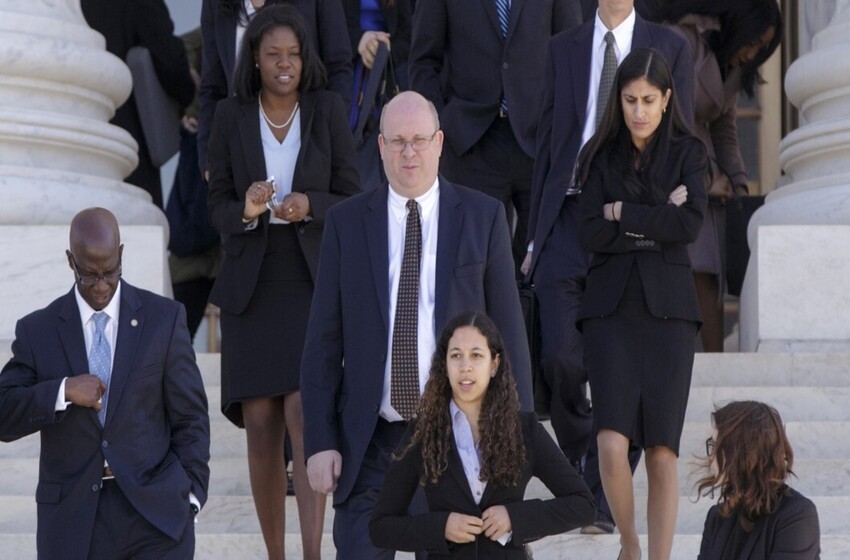Democratic election lawyer of Steele dossier fame sanctioned by Texas court

DEMOCRAT LAWYERS CAUGHT LYING AGAIN!
by Jerry Dunleavy 15 minutes ago
A top Democratic election lawyer was smacked with sanctions by Texas federal appeals judges for a “redundant and misleading submission” and for violating his ethical “duty of candor” to the court in a case in which the Democratic Party was fighting against a state law that banned straight-ticket voting.
Marc Elias, a lawyer for Perkins Coie who is well known for his election fights during the 2020 contest and for hiring the opposition research firm Fusion GPS, which hired British ex-spy Christopher Steele in 2016, was criticized and punished by the U.S. Court of Appeals for the 5th Circuit on Thursday, along with a number of his colleagues.
Judge Edith Clement, nominated by former President George W. Bush in 2001, and Judge Jennifer Elrod, nominated by Bush in 2007, both ordered Elias and his associates to be sanctioned, while Judge Catharina Haynes, another 2007 Bush nominee, did not.
“Appellees did not notify the court that their latest motion to supplement the record filed on February 10, 2021 was nearly identical to the motion to supplement the record filed several months ago by the same attorneys, on September 29, 2020. Critically, Appellees likewise failed to notify the court that their previous and nearly identical motion was denied,” the judges ruled. “This inexplicable failure to disclose the earlier denial of their motion violated their duty of candor to the court.”
The Democratic lawyers, including Elias, were ordered to pay attorneys’ fees and double costs, and the judges recommended Elias and his colleagues to review the section of the Model Rules of Professional Conduct on “Candor Toward the Tribunal” and encouraged them to “complete one hour of Continuing Legal Education in the area of Ethics and Professionalism, specifically candor with the court.”
STRZOK SAID STEELE DOSSIER MEANT TO ‘INFLUENCE’ NOT JUST ‘INFORM’
The Texas secretary of state website explains that in 2017, the Texas Legislature enacted House Bill 25, which amended provisions of the Texas Election Code to end straight-party ticket voting effective Sept. 1, 2020, two months before the November election.
A federal judge cited the pandemic to put the practice back in place in September 2020, but the appeals court overruled that and upheld the law that month.
Texas Democrats opposed the law when it passed in 2017 and argued in 2020 that it would have disproportionate impacts on black and Hispanic voters, who form major Democratic constituencies.
Republicans argued a duly passed law from the Legislature should stay in place. The battle continued winding its way through the courts into 2021.
The appeals court judges said this week that the Democratic lawyers pushed a “redundant and misleading submission” and that “there is no legal basis to support Appellees’ post hoc contention that motions to supplement the record apply only to one stage of an appeal.”
“If Appellees had any confusion about the application of the order, they could have and should have disclosed the previously denied motion in their new motion. Moreover, after Appellant notified Appellees that they intended to file a motion for sanctions based on this lack of candor and violation of local rules, Appellees could have withdrawn their motion. But they did not,” the judges said. “Instead, they stood by a motion that multiplied the proceedings unreasonably and vexatiously. Sanctions are warranted in this case to deter future violations.”
The Perkins Coie lawyers represented the Texas Alliance for Retired Americans, the Democratic Senatorial Campaign Committee, and the Democratic Congressional Campaign Committee in a lawsuit against Texas Secretary of State Ruth Hughes, who was represented in court by Texas Attorney General Ken Paxton.
In February, the Texas Republicans argued to the appeals court that the Democratic effort to reimpose straight-ticket voting statewide “rests on shaky factual and legal ground” as they cited a prior appeals court ruling. They argued the Democrats “have an evidence problem: specifically, they have none.”
“The Secretary’s request for sanctions — based entirely on Plaintiffs’ motion to supplement the record in response to a standing argument advanced by the Secretary for the first time on appeal — is both extreme in its reach and entirely groundless,” the Democratic lawyers replied in late February.
But the court agreed with the state of Texas.
“Elias has no valid explanation for the misleading submissions to the Fifth Circuit. Even when they were notified that they violated ethical rules, they refused to withdraw their motion. They were aware of their violations and blatantly chose to ignore them,” Paxton said Friday. “I thank the Court for issuing these much-needed sanctions. Perkins Coie cannot continue to mislead the Court, especially in a matter as important as election integrity.”
Elias did not respond to the Washington Examiner’s request for comment, but his firm defended the Perkins Coie lawyers.
“We do not normally respond to requests for comment on pending litigation, but the firm and the attorneys involved in this matter strongly disagree with the appellate court’s ruling and its order of sanctions in this case,” Perkins Coie said Friday. “The firm fully and completely supports our attorneys in this case.”
CLICK HERE TO READ MORE FROM THE WASHINGTON EXAMINER
Elias, who is the head of the Perkins Coie political law group and former Secretary of State Hillary Clinton’s campaign counsel, hired Fusion GPS on behalf of the campaign. He testified that he was aware of Fusion’s plans to have Steele brief reporters about his anti-Trump research during the 2016 contest. Elias met with Steele during the 2016 contest and periodically briefed the campaign about Fusion’s findings.
DOJ Inspector General Michael Horowitz’s December 2020 report criticized the Justice Department and the FBI for at least 17 “significant errors and omissions” related to the Foreign Intelligence Surveillance Act warrants against former Trump campaign adviser Carter Page and for the bureau’s reliance on Steele’s discredited dossier.
Elias, who was also the general counsel for Vice President Kamala Harris’s bid, gained popularity during 2020’s election court battles. Former Attorney General William Barr has repeatedly said that the Justice Department did not unearth evidence of widespread fraud that could have changed the outcome.
















